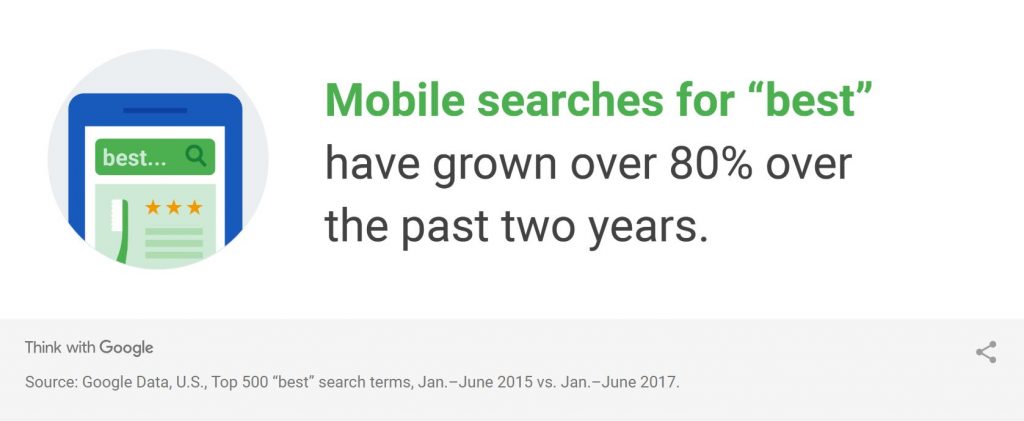It seems fairly straightforward. When people set out to shop for an item or service, they hope to end up with the best possible outcome. But it turns out that “the best” isn’t an objective absolute. In fact, finding “the best” isn’t necessarily about finding the best thing that exists, it’s about finding the best thing for your needs.
It was pretty clear to us from consumer search data that people’s quest for the best is still on the rise. Mobile searches for “best” have grown over 80% over the past two years.1 And they’re searching for “best” for even the smallest stuff: We’ve seen strong growth in things like “best toothbrush” over the past couple years.

But Google wanted to understand what was driving people to search for “best” and what the word meant to them. To better understand how people are defining “the best” — and using it as a tool in their shopping — I sat down with Google’s Head of Ads Research and Insights Sara Kleinberg to discuss what her team has been finding in Google data and hearing from consumers.
How has online research changed the quest for the best?
Sara Kleinberg: With so many options and so much information online, consumers increasingly can and have to make decisions based on differences beyond quality, price, and basic features. The deciding factor is often personal criteria for that product and how it solves their individual needs. Convenience, for example, can enter the “best” equation. One person told us, “A taqueria 10 miles away might have 400 5-star reviews, but I'd be fine with a 4.5-star taqueria a stone’s throw away.” One person might be swayed by product features, whereas another won’t. “I don’t care if a vacuum cleaner has a light on the front or an automatic cord winder. The best one for me is best at picking up pet hair,” another person said. That’s not to say price and quality aren’t part of the picture. But how they fit in depends on the shopper. As one person said, “I don’t necessarily look for the best product in the market, but for something that would be the best for what I need the product for.”
With so many options and so much information online, consumers increasingly can and have to make decisions based on differences beyond quality, price, and basic features.
How are people searching for ‘the best’? What kind of things do people search for?
They’re using search across the spectrum, for items big and small. Sure, people are still going to search for “best car” or “best TV,” but we’ve also seen significant growth in mobile searches for things like “best face lotion” or “best moisturizer,” which have grown over 115% in the last two years2 (for example, “best moisturizer for face,” “best face lotion for dry skin,” etc.).
And they’re looking for specific answers. It’s not just “best car insurance,” it’s “best car insurance for me.” It’s not only “best shoes,” it’s “best shoes for standing all day” or “best walking shoes for women.”
We also see how “best” takes on different meanings in different contexts. Someone searching for “best champagne” is likely looking for different answers than someone looking for “best champagne for mimosas.”
Any insight into why getting ‘the best’ is important to consumers?
It’s about confidence. We’re seeing people do more extensive research for both big and seemingly small purchases so they can be confident they’re making a good decision. “Getting the most for my money” is something people told us. That and they want to be sure they won’t “later regret buying the items.”
What kind of results do they expect to get back when they type in ‘the best’?
Consumers told us searching “best” helps save time by returning a curated list of fewer options or aggregated rankings, ratings, or reviews from consumers and experts. You can see the difference between search for results for gas grill and for best gas grill. People also like seeing videos that show the product in action or are made by people “just like them” who had similar criteria. Corroborating all of these sources helps consumers feel confident that this choice is right for them too.
If I love something, I'm going to search far and wide until I find one that literally makes me quit searching.
Have you seen any willingness to make trade-offs?
We’ve actually had people tell us it’s not always necessary to get the best thing. They’re more discerning about getting the “best” when it speaks to who they are and what they care about. That could be a category, like hiking supplies, or a trait, like someone who tries new things. As one person told us, “If you don’t have as strong of an interest in a certain area, you don’t feel you need to purchase the best. When you really care about something, I always seek out the best because it’s something I take great pride in.” “It's not important to always find the best out there,” another said. “But if I love something, I'm going to search far and wide until I find one that literally makes me quit searching.”
This all seems fairly nuanced. How can marketers turn this into an opportunity?
Since “best” is personal, look at “the best” and other specific search terms for your brand and category to confirm what needs consumers are solving for. Realize that specific searches can indicate a high-involvement purchase and clear intent. Someone searching for “best baseball bat for an eight-year-old” or “best foundation for acne prone skin” is likely spending time and energy evaluating you and cares about getting the best in your category. Ensure your content and search copy convey how your products meet these needs and that you show relatable, real-life use cases. Google’s machine learning can automate keywords and ad creative to help you capture the various ways consumers are expressing this quest for the best.

